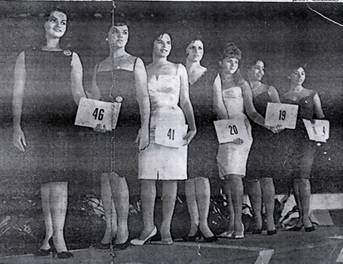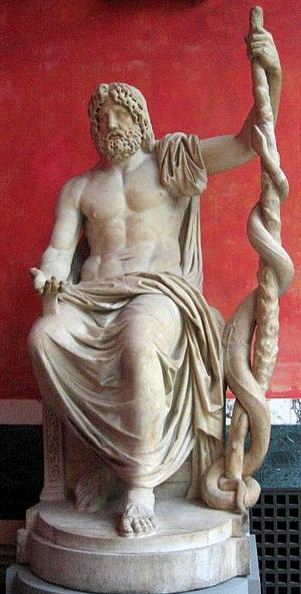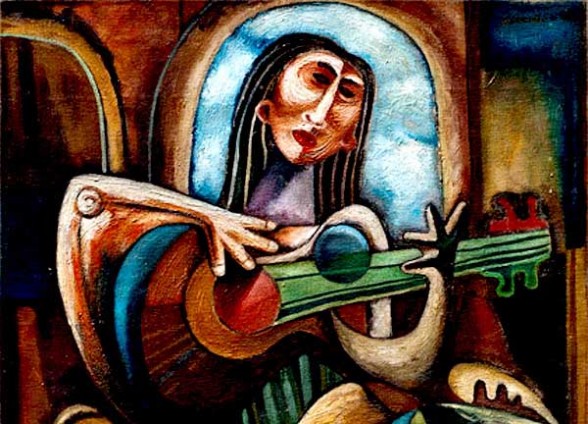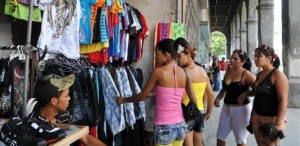 A few weeks ago I wrote a response about a naive comment on my blog that they signed under the name “Lori” where the following was recommended:
A few weeks ago I wrote a response about a naive comment on my blog that they signed under the name “Lori” where the following was recommended:
“It is my desire to improve myself, read books by writers who have had to leave my country. Read the bloggers of Vocesdecuba.com, come to Cuba and take the bus, walk the streets. Leave the tour guide and talk to people on my own, those who don’t give a learned speech that protects them from being persecuted. I wouldn’t stay in the hotel pool, but would walk along the malecón and learn about the Cuban reality. I wouldn’t waste my time with the shows at the hotel. I would go to the theater, to see the dilemmas facing today’s society. I wouldn’t buy only traditional music, which they recommend, but also the music that is not promoted, and whose songs are passed, thanks to Bluetooth, from cell phone to cell phone.”
This afternoon I remembered the many “Loris” who hide behind a nickname, either by ingenuity, opportunism or because they are actually cybernetic soldiers in the service of the Cuban state. I invoked them while attending the Bertolt Brecht Cultural Centre for the performance at the Vital-Theatre, of Four Less, by the playwright Amado del Pino, which won the Carlos Arniches International Award (2008) in Spain.
When the Director-General Alejandro Palomino said to light up the stage, on opposite sides appeared two small and humble rooms. In the center, a park bench, the kind that are scattered throughout the island and where Cubans still go to give flight, incredibly and with that stubborn calling, to their dreams and hopes for a dignified life.
The work, intense from the start, which builds to a crescendo from which the story breathes and takes shape, and, well, without being trite, could be called empty-nest syndrome, proposes a journey through a family’s destinies. Generations that harbor different and conflicting illusions. Andrés, the typical old father, a destroyed leader, expelled from the Communist Party, the usual stubborn and honest character that nevertheless needs to continue clinging to utopias, to promises that fade like clouds, who persists in his blindness to the present time and the changes that are imposed for a society lacking the most objective necessities, although he survives in a miserable reality, where fear, opportunism, spite and the abuse of sexual rights converge in an environment that doesn’t help heal the wounds.
Tamara: And that is your job? Do those who run things love you? Look, the worst is that there is no room even for a guy as romantic as you, who holds on to being revolutionary. (spoken with emphasis) Re-vo-lu-cio-nary, not to repeat the same litany…
Ania is Andrés’ daughter, who as a minor requires his signature to emigrate and definitively leave behind their home, and a country that is falling apart without mitigating the imposed conditions of extremism, which her generation doesn’t accept or understand or consider relevant. The mother, the ex-wife, begs him not to agree, that he not allow her to go.
Ania: I can’t take any more speeches, papá.
Tamara: … and at this rate we will have asylum in America!
Pollo: I had a professor who said you have to give up the past for the young. Not out of kindness but because if you only go half-way, they will knock you over and and go by on top of you.
Tamara: This is the only country where people don’t retire, where ministers are 70 years old. If there is no retirement, everything gets confused and you reach your forties receiving treatment as if you had young promise, with tender certainty of tomorrow.
Andrés:We have become a marriage agency. Here the “uncoupled” Europeans meet partners who are healthy, educated, enthusiastic and even passionate. An entire nuptial prostitution!
In addition, Andrés has a son from a previous marriage, Saul, and because he did not give him legal authorization to leave the country, he separated Saul from his mother, who decided to give custody to the grandmother, so Andrés has a guilty conscience.
Saul: I never knew if you refused to sign to protect me or so you would not have your own problems, and that doubt was certainly the worst part of all.
Andrés: Now would be the time to answer you but I have no answer. Nor do I know;Â I was mixed up by convictions, by fear ….
Saul: Don’t go looking for answers, papá. They’re not needed. I want to learn to live without asking so much.
As if that were not enough conflict, Tamara, Andrés’ current wife, 15 years younger than he, is expecting her first child and has received a job offer abroad with the possibility of his accompanying them and which he refuses to consider, because leaving is treason, and also because he feels ashamed about his son Saul, who he separated from his mother and who, after all, has had the chance to emigrate, because he works on a cruise, but always returns.
Tamara: What can you offer your next child? Maybe you’re denying him the possibility of a better life!
All the pros and cons of life as seen from different angles and options, accompanied by the characteristic humor that Amado del Pino places in his works, and that makes us feel like we’re there listening, a mental game of sympathy that infects us with brief sparks of cubanía.
Pollo is a gay friend and work colleague of Andrés. He has refused to join the Communist Party, because it’s the same people who berated him for his courage and honesty in living openly with his partner.
Pollo: It’s fashionable now to save us, to claim us, to enfold us, but neither am I going to ride – as old as I am – in that “triumphal” car. The boss called me on Monday to tell me that they offered me membership in the Party, now. If that means being in the vanguard, they should have given it to me a long time ago.
Andrés is discussing his doctoral thesis, which has been rejected because it was a study showing the low birth rate in the country, considering that young people emigrate at the time when they would normally be having children, and which would have given him his degree.
Tamara: Condemning those who leave or go away is shitty. Some do more damage by staying. My uncle watches the Round Table every afternoon and believes 100 percent of what they say on TV, but he dresses, eats and fixes up his home with what my cousins, who left, send him. I know he’s not rude, he still believes his ideas are true, but it seems to him that it’s too much to continue loving them, to pick up the phone and accept that they aren’t traitors. And that we are in the 21st century, because he buried his younger sister alive when she left for Puerto Rico.
Andrés: I suffer with the defects of this Revolution precisely because it’s mine.
Tamara: That’s the worst part of your thesis.
Andrés: If the young people leave, who are we going to work with? Who are we going to convince?
There’s a moment of greater anguish when Andrés accompanies his daughter to the airport, and she sings a verse of Fragancia. Then the sound of the plane taking off until a light goes out and leaves the stage dark.
The public swallows its suppressed tears because most of us suffer a similar separation.
Next comes a light that reappears like the birth of dawn.
Andrés: Fuck whoever invented the airplane – an agonized sentence because he can still hear the rumble of the engines.
Final theme song: “Thinking, thinking, tell Fragrance that I love her, that I cannot forget her, that she lives in my soul, go and tell her… tell her that I think about her, although she doesn’t think about me.”
Sometimes we doubt if life is different from theater, novels, conflicts that we writers invent and cast to the streets like a virus which then mutates and adapts to the environment to achieve greater damage. How do we measure the influence of our Art on the times, in the actual context of social life? And to what extent can we warn the next generations so they won’t be deceived like us?
I congratulate the playwright Amado del Pino for helping to disseminate with his art the hardships of the Cuban people, which are the same. A reality so alive and Cuban these days, like the royal palms. A denunciation of the social conflicts in today’s Cuba with respect to human feeling, regardless of their place of origin, language and geographic latitude. A perfect canvas that spreads, like rays of light to dark and unknown corners, with the technical and precise colors of Art in its fullness.
I counted the seats that were occupied and came up with 484, and because there were no more, they used the stairs and some chairs around the edge of the stage. Outside there were, like there have been for several weeks, two times that number of spectators who welcomed the news that the run would be extended until October 23.
I wish the Cuban communities scattered throughout the world could enjoy this work, inviting the group Vital-Theatre to book fairs and theater festivals, or by having it put on by artists in other cities. How is not important. The urgent need is to spread the work to get a greater understanding by other spectators about a national reality that has condemned us for over 50 years.
And paraphrasing a text of the play, I would like to remember that 50 years is two times 25. It is five times 10. That means 10 multiples of five. Fifty percent of a century. The full life of a man. A time and space where three or four generations converge, and that the most advanced has not been able to improve the fate of the last, in which coincide the fears and cause hair to fall out and wrinkles and furrows to appear on faces worn out by tears at seeing the departure of our children, siblings and friends. Several descendants who face the same abyss. They lose their teeth and their illusions. We have always been “four less,” up to a hundred less, thousands and millions less who walk scattered around the planet and whose spaces await them on this island of all.
Now it’s time to return. To retake the reins of a runaway country. To be able to spread hope in a land that doesn’t know that crop, so that eventually it serves as gratitude to all those who, in the past 200 years, have given their life for the Cuban nationality, free and authentic. This we owe to them who knew how to die for us, without having earned on our own a minute of that bitter agony.
Let them live in glory!
Translated by Regina Anavy
October 11 2011



 They meet up every Saturday night for a party, without alcohol, without girls, without music. They spend all night in front of the keyboard looking at the screen, with their computers connected to the web to play. It’s the latest thing among Cuban teenagers, especially among boys of the emerging middle class who don’t even recognize themselves as such. “Slumber parties” with popcorn and tents set up in middle of the living room have given way to these get togethers where technology mixes with laughter, the playful with the escapist. The young people themselves call these tech marathons “turbos,” and many rent places to spend the night with their hands on the mouse. Among the most activities most in demand are games of strategy, parallel cosmologies that help them escape from the national reality.
They meet up every Saturday night for a party, without alcohol, without girls, without music. They spend all night in front of the keyboard looking at the screen, with their computers connected to the web to play. It’s the latest thing among Cuban teenagers, especially among boys of the emerging middle class who don’t even recognize themselves as such. “Slumber parties” with popcorn and tents set up in middle of the living room have given way to these get togethers where technology mixes with laughter, the playful with the escapist. The young people themselves call these tech marathons “turbos,” and many rent places to spend the night with their hands on the mouse. Among the most activities most in demand are games of strategy, parallel cosmologies that help them escape from the national reality.






